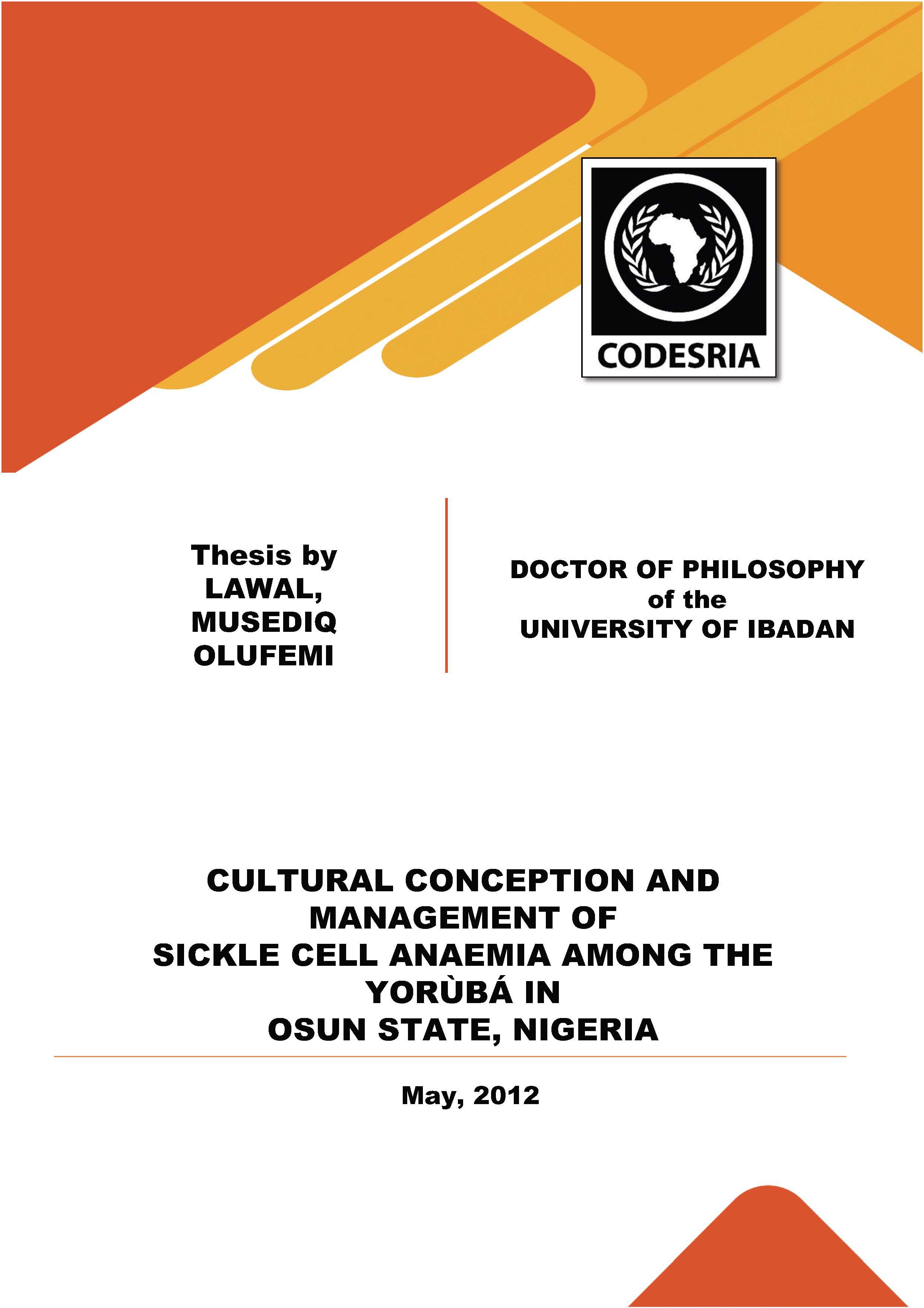CULTURAL CONCEPTION AND MANAGEMENT OF SICKLE CELL ANAEMIA AMONG THE YORÙBÁ IN OSUN STATE, NIGERIA
Keywords:
Anaemia, cultural factors, disease control, disease management, cultural conception, Yoruba, Osun State, NigeriaSynopsis
Sickle Cell Anaemia (SCA) is a family of haemoglobin disorders with adverse effects on
emotion and social stability of carriers and their families. It has high prevalence rate in
Nigeria with over 100,000 babies born with it annually. Studies on SCA have adopted
biomedical approach with very few related to its social and cultural perspectives. Against
this background, the study examined cultural conception and management of SCA among the
Yoruba in Osun State as a way of establishing the level of awareness and knowledge of SCA
as well as identifying the pathways to its treatment.
Using Weber’s Social Action theory and Health Belief Model as explanatory framework,
quantitative data were collected through a household survey carried out in four Local
Government Areas (LGAs) of Osun State – Ejigbo, Ife East, Ilesa West, and Ila. Utilising a
multistage sampling procedure, a total of 2,016 copies of questionnaires were administered to
community members spread across 48 Enumeration Areas (EAs). Eighty in-depth interviews
were conducted comprising 39 Sickle cell patients, 20 primary caregivers, and 21 healthcare
providers. Ten case studies were equally conducted across patients, caregivers and healthcare
providers. Quantitative data were analysed using percentage and Chi-square while
qualitative data were content analysed. Four hypotheses focusing on conception and
management of SCA were tested at 0.05 level of significance.
There was an overwhelming (99.7%) acknowledgement of the existence of SCA in all the
communities with the common lexical index of ‘f’oniku f’ola dide’ (intermittent crises). The
disorder was highly conceived as non-biological in rural areas as against biomedical in urban
centres. The pathways and treatment regimen in rural areas included home remedies,
divination and faith-based healing with low patronage of western medicine. In the urban
centre western medicine combined with faith healing is predominant. Across geographical
zones, economic status (15.5%), belief system (23.2%), available medical services (24.7%),
interpretation of ill-health (36.9%) and perceived efficacy of previous treatment (56.6%)
influenced the management of SCA. Furthermore, definitions given to SCA influenced its
management significantly (χ2=130.4, P<0.05) as rural dwellers with traditional conception
often utilize unorthodox facilities. Geographical locations significantly influenced
interpretation of SCA (χ2=47.1, P<0.05) with urban interpretation moving towards biological
model as against that of rural. Respondents’ sex (χ2=23.9, P<0.05) has influence on
conception of the disorder with males having less drive in the search for the cause of the
disorder. Educational status (χ2=232.9, P<0.05) equally influenced conception as high
Western education was positively related to biological conception while income (χ2=82.5,
P<0.05) influenced the choice of healthcare for the management of SCA.
Belief in non-biological cause(s) of Sickle Cell Anaemia will continue to sustain the
prevalence of the disorder, particularly in the rural areas. Therefore, interventions such as
pre-marital counseling, education on biological causes of Sickle Cell Anaemia and
establishment of sickle cell clinics are needed for addressing the prevalence chain.
Downloads
References
Abdulsalam G. 1992. “Ethnicity and Transcultural issues in the medical setting” Journal of
Community Health Services, Vol. 34, No. 112-3
Abu, K. 1983. “The Separateness of spouse conjugal resources in an Ashanti town” in
Christine Oppong (ed.), Female and Male in West Africa, London: George Allen and
Unwin
Adegoke B. 2001. “Survival patterns and coping system in Chronic Disease management in
developing society” Journal of Socio-psychology and Reproductive health services,
Vol. 9:28-35
Adeleye, J.A. 1997. “Sickle Cell Disease in Pregnancy” in Toye Ogunbode (ed.), Medical
Disorders in Tropical Obstetrics, Ibadan, Nigeria: Evans Brothers (Nigeria Publishers)
Limited, p. 136.
Adeniyi, S. 2006. “Herbal cure for sickle cell disease now exists in Nigeria” Nigerian
Tribune (Newspaper), Wednesday, 15 February, p. 19.
Adetoro, A.A. 2008. “Socio-cultural factors influencing HIV Transmission in Osun State,
Nigeria” (Unpublished PhD thesis submitted to the Department of Sociology,
University of Ibadan)
Adewuyi, J.O. and Akintunde, E.A. 1990. “Survey of haemoglobin genotypes in children at
Ilorin” Nigerian Journal of Paediatrics, 17(162):23-26
Agbonlahor, F.I. 1995. “The determinants of maternal and child health care decisions in Edo
State, Nigeria (Unpublished PhD Dissertation in Department of Sociology, University
of Ibadan, Nigeria)
Aja, Egbeke, 1999. “Metaphysics and Medicine: The traditional African Experience”
(Africa’s Indigenous Technology) West African Journal of Archaeology
Akenzua G.I. 1990. “Screening for psychosocial dysfunction in children with sickle cell
anaemia” Nigerian Journal of Paediatrics, 17:15-21
Akinsola, H.A. 1993. A to Z of Community Health and Social Medicine in Medical and
Nursing Practice with special reference to Nigeria, Ibadan, Nigeria 3 AM
Communication, pp. 12, 13, 111.
Akinyanju O.O. 1989. “A profile of Sickle Cell Disease in Nigeria” Annals of the New York
Academy of Sciences. Vol. 565, Issue 1:126-136
Akinyanju O.O. 2001. “Issues in the Management and Control of Sickle Cell Disorder”
Archives of Ibadan Medicine, 2(2), pp. 37-40






